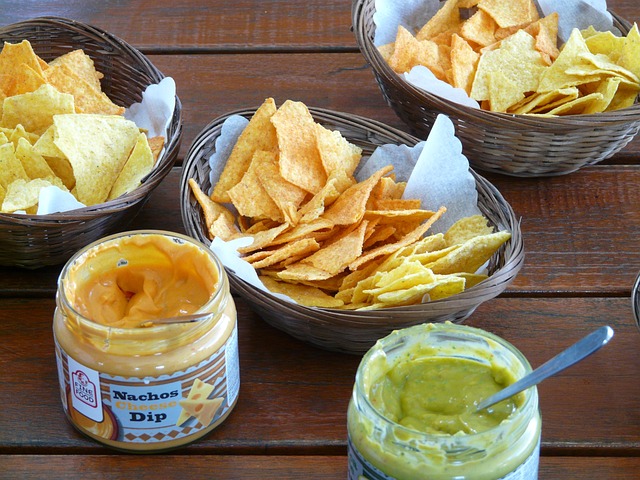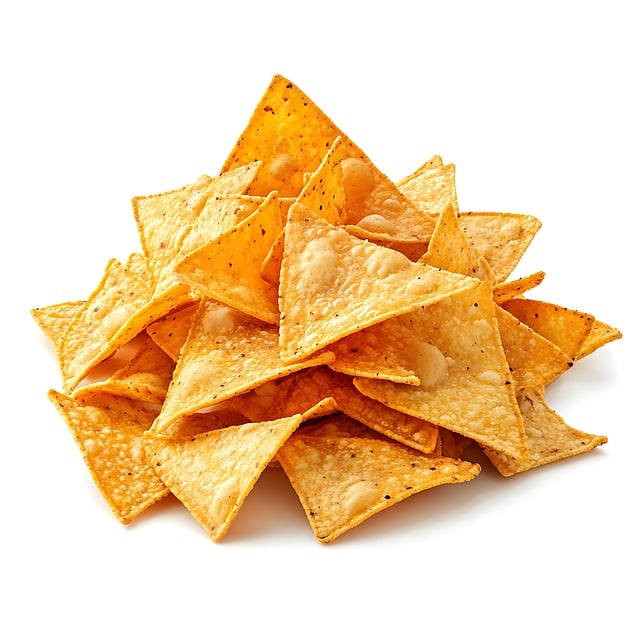The growing demand for authentic, high-quality non-GMO tortilla chips in Mexican restaurants reflects a consumer shift towards transparency, health, and sustainability. This trend drives establishments to source corn from small-scale producers, promote fair trade practices, and prioritize artisanal production methods that ensure taste, nutrition, and environmental friendliness. By offering handcrafted, non-GMO tortilla chips, these businesses cater to health-conscious diners while celebrating Mexican culinary heritage and fostering a connection to authentic, traditional flavors. This mission aligns with a broader industry push towards sustainable food production and caters to modern palates seeking natural, high-quality ingredients.
In today’s culinary landscape, handcrafted tortilla chips are making a significant splash in Mexican restaurants. The Rise of Handmade Tortilla Chips in Mexican Restaurants explores this trend, highlighting the growing demand for authentic, high-quality snacks. With a focus on non-GMO ingredients (a key SEO keyword), this article delves into the benefits of using artisanal tortilla chips and the art behind their traditional production. We also examine how consumer preferences are shaping the future of tortilla chips, emphasizing quality assurance and consistency in restaurant kitchens.
- The Rise of Handmade Tortilla Chips in Mexican Restaurants
- Non-GMO Ingredients: A Growing Trend in Food Production
- Benefits of Using Handcrafted Tortilla Chips
- The Art of Making Traditional Mexican Tortilla Chips
- Quality Assurance and Consistency in Restaurant Kitchens
- Consumer Preferences Shaping the Future of Tortilla Chips
The Rise of Handmade Tortilla Chips in Mexican Restaurants

In recent years, there’s been a notable shift in the offerings at Mexican restaurants, with one particular item making waves: handmade tortilla chips. This trend is driven by a growing consumer demand for authentic, high-quality ingredients and transparency in food sourcing. Non-GMO tortilla chips have become a mission for many restaurants, appealing to health-conscious folks who appreciate the difference between store-bought and handcrafted products.
The rise of handmade tortilla chips isn’t just about taste; it’s also about sustainability and supporting local farmers. Many Mexican restaurants are now sourcing their corn from small-scale producers, ensuring fair trade practices and promoting traditional farming methods. This commitment to quality and ethics has resonated with diners, fostering a deeper connection between the restaurant and its customers.
Non-GMO Ingredients: A Growing Trend in Food Production

In recent years, there’s been a noticeable shift in consumer preferences towards food products made with non-genetically modified (Non-GMO) ingredients. This trend is particularly evident in the culinary scene, where many restaurants and food manufacturers are now embracing Non-GMO tortilla chips as part of their commitment to serving healthier, more sustainable options. The demand for these chips reflects a growing awareness among consumers about the potential health risks associated with genetically modified organisms (GMOs).
Non-GMO tortilla chips offer a number of benefits, including improved taste and nutrition. By using only Non-GMO ingredients, Mexican restaurants can ensure their chips are free from artificial additives and pesticides commonly linked to GMO crops. This mission not only aligns with the growing demand for transparency in food production but also contributes to a more environmentally friendly approach, as non-GMO farming practices often promote biodiversity and reduce chemical usage.
Benefits of Using Handcrafted Tortilla Chips

Handcrafted tortilla chips offer a multitude of benefits that set them apart from their machine-made counterparts. One of the key advantages is the assurance of freshness; each chip is made with care, ensuring a crisp and vibrant flavor profile that captivates the senses. This artisanal approach also allows for greater control over ingredients, making it easier to source high-quality, natural, and even non-GMO options, catering to health-conscious consumers.
Moreover, supporting local, handcrafted products contributes to a sustainable food culture. By choosing these chips, diners encourage traditional culinary practices and promote businesses that prioritize quality over mass production. This mission not only enhances the overall dining experience but also fosters a deeper connection to the heritage and authenticity of Mexican cuisine.
The Art of Making Traditional Mexican Tortilla Chips

The art of crafting traditional Mexican tortilla chips is a meticulous process that combines ancient traditions with precise techniques. It begins with carefully selected, non-GMO corn tortillas, hand-cut into uniform triangles to ensure even cooking. These tortillas are then fried in vegetable oil, creating a golden-brown crispness that’s essential for the authentic taste. The secret lies in the frying time and temperature, which must be precisely controlled to achieve the perfect crunch without burning.
Many top Mexican restaurants take pride in making their own tortilla chips on-site, using fresh ingredients and traditional methods. This commitment ensures quality, consistency, and a distinctive flavor that captivates diners. By offering homemade non-GMO tortilla chips, these establishments not only cater to health-conscious customers but also create a unique dining experience that showcases the richness of Mexican culinary heritage.
Quality Assurance and Consistency in Restaurant Kitchens

In restaurant kitchens, maintaining quality assurance and consistency is paramount, especially when it comes to serving signature dishes like homemade tortilla chips. For Mexican restaurants, this means ensuring every batch of non-GMO tortilla chips meets the same high standards. This commitment extends beyond just taste; it involves texture, color, and even the slightest variations in temperature during frying. Consistent quality not only guarantees customer satisfaction but also builds a loyal following for the restaurant’s unique take on non-GMO tortilla chips.
To achieve this, dedicated kitchen staff plays a crucial role. They follow precise recipes and preparation methods, regularly calibrating equipment to maintain consistency. Moreover, sourcing high-quality, natural ingredients is integral to the process, ensuring the chips not only taste authentic but also appeal to health-conscious consumers. This meticulous approach underscores the restaurant’s mission to deliver exceptional dining experiences through what starts as a simple yet crucial component: the perfect tortilla chip.
Consumer Preferences Shaping the Future of Tortilla Chips

In today’s food landscape, consumer preferences are driving a significant shift towards healthier and more sustainable options, including non-GMO tortilla chips. Many Mexican restaurants and chip manufacturers are responding to this trend by offering their guests and customers high-quality, natural alternatives. The demand for non-GMO products has become increasingly important as folks become more conscious of the ingredients in their food and its environmental impact. This shift not only caters to health-conscious consumers but also supports a mission to create a more sustainable future for tortilla chip production.
As a result, traditional tortilla chips are being reinvented to meet these new demands. Restaurants are incorporating locally sourced, organic ingredients and innovative production methods to create crispy, delicious non-GMO tortilla chips that resonate with modern palates. This evolution in the way chips are made reflects a broader consumer preference for transparency in food sourcing and processing, ensuring that every bite is not only tasty but also aligns with eco-conscious values.
The resurgence of handmade tortilla chips in Mexican restaurants signifies a culinary journey back to traditional, quality ingredients. With a growing demand for non-GMO options and consumer preferences leaning towards authentic, handcrafted products, the industry is witnessing a revolution. This trend not only enhances the dining experience but also ensures consistent, high-quality tortilla chips on every plate. As Mexican cuisine continues to captivate global palates, the use of natural, non-GMO ingredients in tortilla chip production remains a key focus, shaping the future of this beloved snack.
